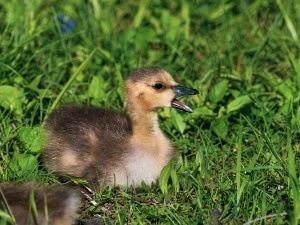
Ducklings starting out need constant supervision to make sure that nothing happens to them. These birds are quite weak and are prone to suffering from a variety of ailments and injuries.
If your duckling is flipping on its back you can assume that something is wrong with the bird. Read on to find out what is wrong with your bird
Table of Contents
Duckling flipping on back:
A duckling flipping on its back is strange behavior that needs to be looked at and in some cases, treated. Here is why this may be happening:
Uncoordinated:
This is a simple answer but it very well may be why your bird is flipping on its back. Ducklings are not all the same, some duckings are simply uncoordinated and will flip themselves on their back from time to time.
If the bird isn’t showing any signs of being in distress or being ill, then something as simple as uncoordination may be the reason why your duckling is flipping on its back
What to do:
As long as the bird is only flipping on its back, and isn’t showing any other signs of being in distress or ill, then you have nothing to worry about, sometimes birds just do this.
Let the bird be and the bird should right itself up after flipping on its back. The bird will eventually grow out of this habit and won’t flip itself on its back anymore
Why neck:
Another reason why your bird may flip on its back may be because the bird has wry neck. This condition, also called crook neck, or stargazing, is more common in ducklings than in adult ducks but it can happen in ducks of all ages.
The causes of wry neck include a vitamin deficiency, namely a vitamin B1 and vitamin E deficiency, genetics, ingesting toxins, or a head injury.
Wry neck keeps the bird’s neck from being able to hold its head up, the bird can then flip over on its back as a result.
Other signs of wry neck in ducklings include being unable to walk and walking backward.
What to do:
This ailment needs to be treated as soon as possible, wy neck keeps the bird from being able to eat and drink, and it can also result in other birds trampling on the baby bird. This can be fatal to the bird
If the wry neck was caused by a vitamin deficiency then you’d need to supplement these vitamins into the bird’s diet.
If you’re supplementing vitamin E into the bird’s diet you’d need to make sure to also supplement selenium into the bird’s diet as well because selenium boosts the effectiveness of the vitamin E.
You can add vitamin E to the bird’s diet using natural sources or supplement tablets. Natural sources of vitamin E include thyme, sage, cloves, and basil.
You can supplement vitamin B1 in the form of supplements or in the form of food. Foods rich in vitamin B1 include wheat germ, bran, sunflower seeds, and brewers yeast.
A well-rounded diet in general is key to good health and will keep your bird from developing a number of ailments.
Also, while treating the bird, keep it separated from the other birds so it doesn’t get trampled. Give the separated bird access to its own food and water during recovery.
Be patient during the bird’s recovery, recovery will take weeks or longer.
Toxoplasmosis:
If the duckling isn’t uncoordinated, and the bird doesn’t have wry neck, then the bird may have toxoplasmosis. This ailment is a parasitic disease caused by a coccidian protozoan parasite.
Toxoplasmosis not only affects ducklings, but it can also affect other birds, reptiles, and even mammals.
Birds like waterfowl, ducks included, and turkeys who contract this disease are usually asymptomatic so you won’t see symptoms of the disease in a bird that has it.
However, young ducklings will usually suffer quite a bit if they contract this ailment.
Symptoms of this ailment in birds include birds flipping over on their back, birds being uncoordinated, paleness, weight loss, diarrhea, trembling, blindness, and whitish droppings
What to do:
Treatment opinions for this condition include a medication called pyrimethamine as well as a medication called sulfadiazine.
Treatment opinions will kill the parasite that causes this condition but if the parasite has already damaged the bird’s central nervous system then this can’t be repaired.
FAQ:
Why is my duckling laying on its back?
A duckling laying on its back is not too concerning, because these animals are so young they lack coordination and will occasionally flip on their backs.
The bird will learn to right itself up, and stop this flipping stage soon enough.
How do you know if your duckling is stressed?
Clear signs of stress in your duckling include not wanting to move, eating drinking, and toileting less than normal, poor posture, and hiding.
If you enjoyed this article then you may also be interested in other chicken related articles. Here are some articles that you may be interested in: Duck Is Choaking, Duck On Its Back, Duck With A Runny Nose, Pekin Duck Swollen Leg, Why Is My Duck Drooling?

